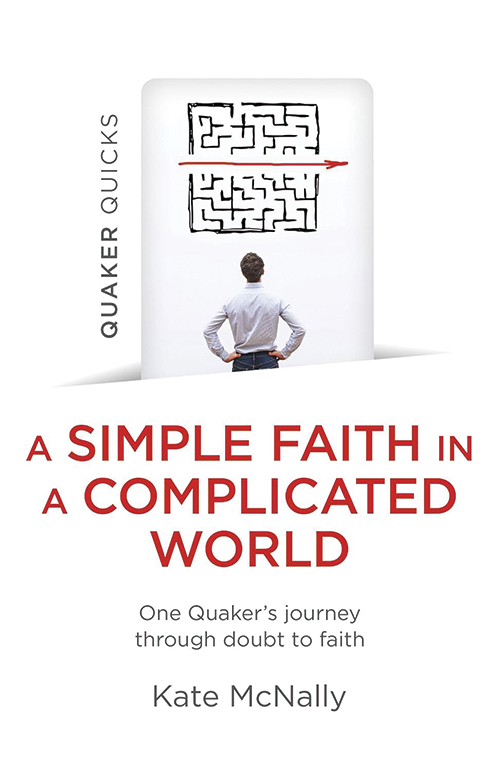
A Simple Faith in a Complicated World: One Quaker’s Journey through Doubt to Faith
Reviewed by Diana Sacerio
August 1, 2024
By Kate McNally. Christian Alternative Books (Quaker Quicks), 2023. 72 pages. $10.95/paperback; $5.99/eBook.
The subtitle of this book points to a personal story, the account of one individual’s spiritual journey “through doubt to faith.” And in the early chapters of the book, author Kate McNally describes her discomfort with many of the tenets of the dogmatic faith in which she was raised. She questioned, for example, the doctrine of original sin, and felt that the Apostles’ Creed skips over the details of Jesus’s life on earth. She longed to know more about Jesus as a historical figure, and she “wanted to find the faith of Jesus rather than the faith about Jesus.” After exploring various faiths during her university years and striving for professional success, she eventually found her way to Quakerism.
However, in later chapters more general observations and reflections are interwoven into her narrative. As a convinced Quaker, McNally is aware that many people know Quakers only through their advocacy work (organizations such as Friends Committee on National Legislation and American Friends Service Committee) and are unfamiliar with such Quaker practices as holding someone in the Light, worship sharing, clearness, and discernment. She provides brief explanations of these practices along with the fundamental Quaker testimonies of peace, equality, truth, simplicity, and stewardship. She recognizes the diversity of Quaker meetings (unprogrammed, programmed, Conservative, Evangelical) and points out that not all Quakers follow the traditions that she describes. And McNally herself seems to be comfortable being around people of different backgrounds and beliefs. On her blog, Brave Spaces, she introduces herself as “a transplanted American with an Irish passport, living in Belgium—between Germany, France, and the Netherlands—in an area where three cultures clash and co-exist.”
In a brief discussion of the origins of Quakerism, she addresses the necessary shift in thinking that results when we move away from traditional images of God and Jesus (God as an omnipotent ruler, Jesus as a blue-eyed European) to having a more direct and personal relationship with the Divine. McNally observes:
Quakers are mystics, which means that we believe that each of us can have direct relationship with God. The mystical nature of Quakerism means that my experience may not be yours. However, I believe that the roots of Quakerism are not in the cathedrals and the hierarchies of Christianity. I believe that those roots are in the man who taught us to just love one another. It’s that simple and that difficult.
The insights that follow are expressed in clear, lucid language and are profound and thought-provoking. How do we love one another? How do we find our way to an intimate connection with God (or for those who eschew the word “God,” with the Divine or some other life force)? McNally believes that God can be found in relationships (with ourselves and with others), through active listening, and in our actions (how we treat each other and show God’s love to others). McNally also emphasizes the importance of silence in Quaker worship: of quietly waiting and opening ourselves to the Spirit. She notes that one’s direct experience of divine love may best be found in a community of Quakers. In order to connect to others and to the Divine, we need to understand ourselves and to accept our imperfections while, at the same time, trying to be our best selves. McNally believes that perfectionism is an illusion and that it is through our weaknesses (as well as our strengths) that we can change and grow spiritually. Before we can “answer that of God” in others we need to answer that of God in ourselves.
This book is by no means prescriptive. Readers of the book will need to follow their own paths to faith. Nevertheless, as Kate McNally traces her spiritual journey, she provides a useful introduction to Quakerism (for those who are new to the faith), and she offers up much food for thought to those who are familiar with Quakerism. This is a book that can be read and studied by individuals or discussed in depth in Friends’ reading groups.
Diana Sacerio is a longtime attender of Haverford (Pa.) Meeting living in Rosemont, Pa. She teaches upper school Spanish at the Baldwin School in Bryn Mawr, Pa., and is an avid reader and lover of literature.



Comments on Friendsjournal.org may be used in the Forum of the print magazine and may be edited for length and clarity.